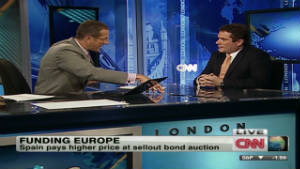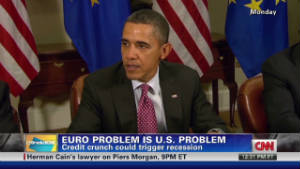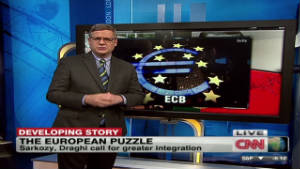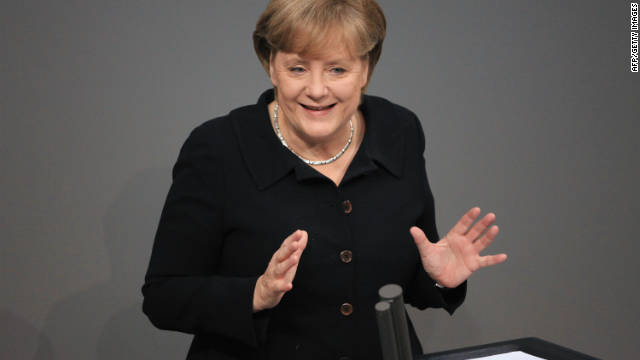Feed: CNN.com - WORLD
Posted on: Friday, December 02, 2011 4:03 PM
Author: CNN.com - WORLD
Subject: Merkel: No quick fixes in euro crisis
German Chancellor Angela Merkel highlighted Friday the need for fiscal union to resolve the debt crisis that threatens Europe's single currency, the euro, and the global economy. |
Merkel seeks urgent action on debt crisis
- "European debt crisis won't be over within a drum beat," she says
- European Union leaders are under fire to address the debt crisis
- Merkel describes it as a "crisis of trust," saying "politics has failed"
Berlin (CNN) -- German Chancellor Angela Merkel highlighted Friday the need for fiscal union to resolve the debt crisis that threatens Europe's single currency, the euro, and the global economy.
"Fiscal union is the aim, one with real power. There is no other way," she said. "We are working for treaty change, we want to avoid a split between euro and non-euro countries."
During the speech to Germany's Bundestag, the country's national parliament, Merkel warned it will take a long time to resolve the financial crisis.
"The European debt crisis won't be over within a drum beat," she said in her government statement.
 Bond yields fall across Europe
Bond yields fall across Europe  Euro problem is U.S. problem
Euro problem is U.S. problem  The European puzzle explained
The European puzzle explained European Union leaders have come under fire to address the debt crisis over concerns it could unravel the euro.
Merkel described it as a "crisis of trust," saying "politics has failed."
A split of the eurozone into members and nonmembers is not an option, according to Merkel.
Despite the long road ahead to find a solution, Merkel said she remains optimistic.
"The euro has proven to be successful. It is stable," she said.
However, she rejected "quick fixes" such as the use of Eurobonds.
"I cannot imagine a common liability for the debts of others," the chancellor said.
Instead, the eurozone needs effective budget integration to solve the crisis, according to Merkel.
Some see eurobonds as a way out of the debt crisis, because they would effectively pool the debt of the 17 eurozone countries. But stronger eurozone countries are concerned about becoming liable for the debt service payments of entire regions without having a say in their future fiscal actions and policies.
She was heavily criticized by Germany's Social Democrats, the leading opposition party. "Ms. Merkel, nobody blames you for this crisis, but your handling of it is going too far. While you are criticizing other eurozone countries, you plan to bring down German taxes," Social Democrat Frank-Walter Steinmeier said after Merkel's speech.
In a news conference with Austria's Chancellor Werner Faymann, Merkel called for a fast solution. The conference took place after Merkel made her government statement.
"We only plan to make the eurozone country's budgets transparent. We don't need referendums to realize this idea," she told journalists.
Austrian Chancellor Faymann supported her. "Our intention to establish a debt limit shows that we take each other seriously," he said.
"I am confident that Ms. Merkel is launching these new initiatives," he said -- referring to claims that Germany is increasingly dominating the eurozone politics.
Merkel compared the times ahead with a marathon. "Runners often say that a marathon gets especially hard after the 35th kilometer. But they also say the finish can be reached if one is aware of the task from the beginning on.
"Not the one who starts fastest is necessarily the most successful (runner)."
Most Popular
Loading weather data ...

















No comments:
Post a Comment